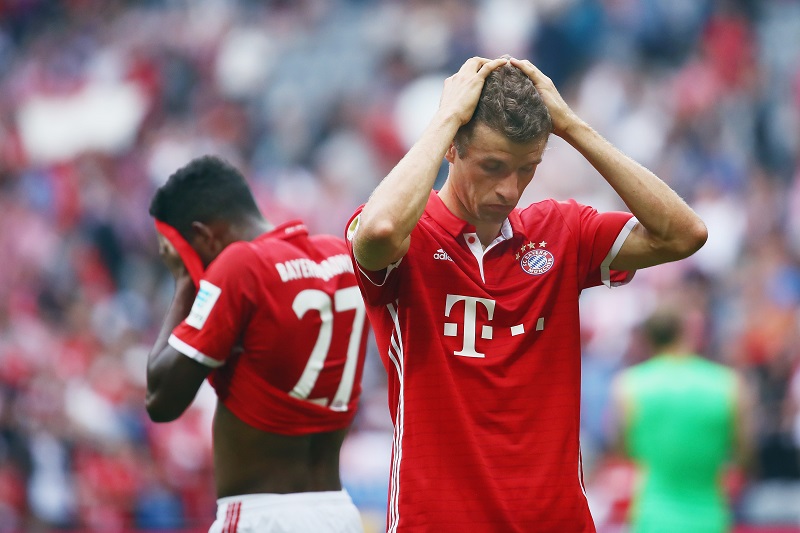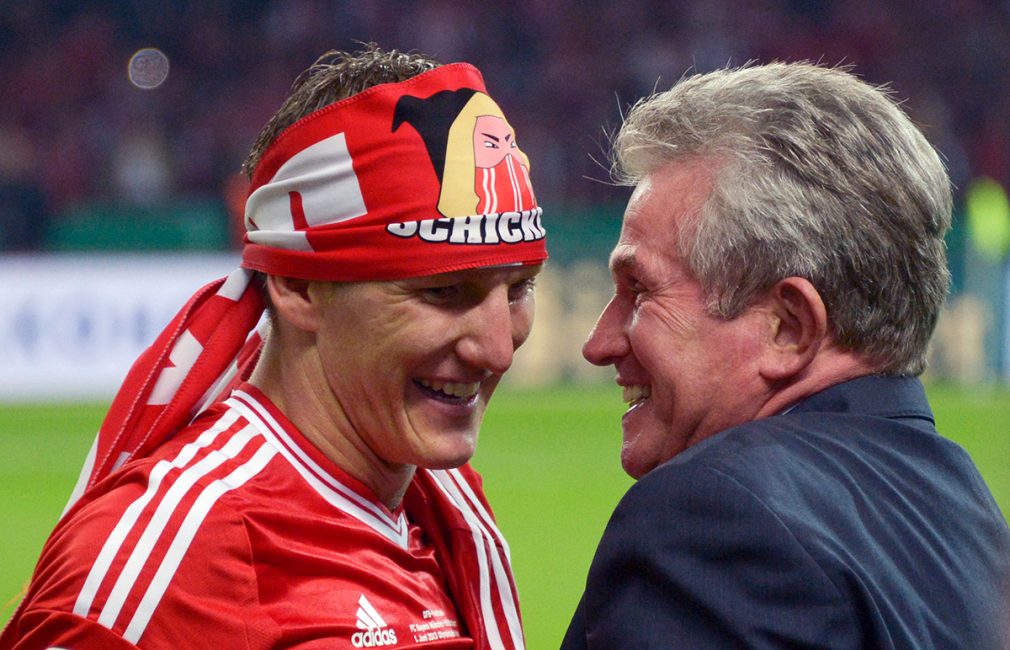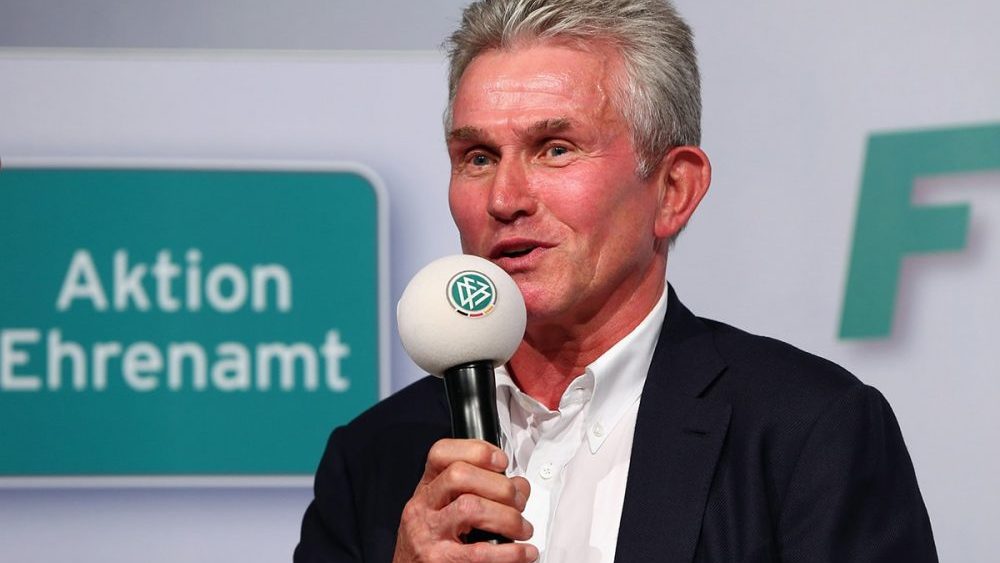Jupp Heynckes is back: these are his challenges!
In the last few weeks, Bayern have been lacking almost everything. Tactical structure, but also the “Mia san mia” that is so eagerly evoked. So now Jupp Heynckes should, on the one hand, provide a flashback, and on the other hand end the era that peaked under his leadership.
He’s doing a huge favour to his friend Uli Hoeneß, even though theoretically he can only lose in this situation. Especially since his tasks in the coming months are rather complex. These can be divided into two sections: the tactical and the psychological.
The tactical tasks
1. Provide structural solutions
On a tactical level, the basic structure is the basis for everything. Only when the team is able to position themselves so that they can profit with and without the ball is there a realistic chance that FC Bayern can play not only successful football, but also attractive football.
It’s unthinkable that a majority of the squad should have simply forgotten the basics of positional play. That may well be the impression at the moment, but individual examples prove that that can’t be the case. In particular the clear and planned-out runs in the final third are lacking in Bayern’s play.
A partially positive example from the match in Berlin:
Müller was mostly active in the right half-space, which was why most of the productive attacks went down that side. During the first half he showed on the other side what kind of details can get Alaba and Ribéry back in the game. With a simple run in the opposite direction to Ribéry’s dribble, he opened up a lot of space and brought chaos into the back-line of the Berliners.
Alaba pulled another player towards himself by backing up the Frenchman. It looked like a rehearsed move. Müller then fritted away the big chance to find a free man in the centre. Partly because the runs weren’t good enough. And so it remained – just like so often in recent weeks – an attempt that wouldn’t stick in the minds of many. For Heynckes it’s a clear signal that he has to provide the team once more with plays and automatisms.
2. Occupy the half-spaces more consistently
Building on the above situation, it’s clear that Bayern only try to support their wingers on the right-hand side. And even there it’s more spontaneous than reliable. How often in our analyses have we complained that Bayern cross too much? The result of a lacking occupation of the half-spaces.
The fact that it sometimes works on the right is solely down to the intelligence of Robben, Müller and Kimmich. When Müller plays, it sometimes looks like creativity, good runs and triangles. Into the area, lay it off, find a gap, back into the space, goal – often enough we had this scenario in the past three, four years. This season, hardly at all.
Simply because there are too few triangles and the players needlessly make their lives complicated. Here, too, there is a fitting scene from the weekend.
Müller presciently moves in between the lines. Boateng plays the ball out wide, because nobody is available in the middle. Thanks to Robben, Müller now has an option. Looking good so far, because Bayern are now in a dangerous area. But then the problems mount. Previously everything moved quite swiftly, but now it takes forever for Kimmich to push up from the back and Lewandowski to offer himself as support.
Preventatively, a midfielder could certainly have held back in the zone marked in red already. Everything just took too long. Hummels (1) is in no-man’s-land and also the double-pivot is everything but present. Kimmich was eventually played in down the flank, but the good approach ended in another cross that came to nothing.
3. Regain dominance in the centre
Another central point on the tactical level is the midfield. This is where games are decided. Ancelotti would too often go for a combination that wasn’t strong enough technically. That either led to everything relying on Thiago or the midfield even being by-passed.
Heynckes will have to find solutions in order to combine technically-strong players (Rudy, Thiago) with players like Vidal or Tolisso. Almost a copy of the Basti-Javi pivot. A clear structure is needed with plenty of triangles in the build-up.
Bayern have been too reliant lately on Hummels or Boateng by-passing the centre and going direct in attack. That’s not enough to control the game, and ends in a simple-to-defend U-shape. The squad offers a few solutions for better control. Depending on Thiago for everything is negligent and doesn’t work in the big games anyway.
4. Strengthen the defence
The defence needs to become more stable again too. That’s not to say only the back-four, but the whole team. Counter-pressing, high pressure, but also staggering in deep areas have to be thought and planned through again. Lately that has all seemed chaotic and not compact enough.
Ideally, Heynckes can reactive the (counter-)pressing that was once so suffocating and stifling. Then Bayern would be likely to concede less again. This, of course, depends heavily on Bayern’s structure with the ball. As remarked at the outset, the biggest and most important tactical task for the new old manager will therefore be giving this team some tactical constraints. That is, above all, a few automatisms. With a good basic structure, everything else can follow.
5. Tactical flexibility
Ancelotti’s Bayern were monotonous, predictable and easy to suss out. Jupp’s Bayern would ideally be more flexible again.
His team stood out at least in 2013 by how they were able to react independently. Let’s see what we can expect this time. Constant switching between systems won’t be what Heynckes stands for either. But that’s not needed either if the team becomes more creative.
You are currently viewing a placeholder content from X. To access the actual content, click the button below. Please note that doing so will share data with third-party providers.
The psychological tasks
1. Strengthen individualists again
The fact that players like Alaba or Müller aren’t having the best of times at the moment naturally has its tactical reasons. But it’s also a psychological problem on top of that. You can see precisely these two players’ reactions after mistakes and how much it throws them off.
So the coach also has to prove himself as a psychologist. There’s self-doubt throughout the entire team and it’s clear with a few that they’ve lost their confidence. Someone is needed to show them that they aren’t weaker than Europe’s best. To awaken the mentality and make come-backs like in Leipzig, not so many months ago, possible again.
It’s the pure “Mia san mia” that has completely deserted Bayern lately. After squandering a 2-0 lead twice in the league, at the end of the match the team couldn’t find another level. The situation got worse and important points were lost on the competition from Dortmund. Eventually Heynckes will have to be measured by whether he can regain the self-image. Here he can gain points soonest.

(Image: Alex Grimm / Bongarts / Getty Images)
2. Regain team spirit
Closely related to the individualists’ self-image is team spirit. The team haven’t been a unit lately. Instead of motivating each other, most players looked reproachful after conceding a goal. Only as a unit, even if only as a means to an end, while this FC Bayern be successful again.
Individual interests belong in the background and the club’s goals must be pursued together. It won’t be straight-forward for the new coach to tame this squad. But who’s going to manage it if not Jupp Heynckes?
3. Take away hope from the competition
This weak phase now means that no team has to be afraid of Bayern anymore. That fear needs to be reactivated. If the team is successful again, the respect will grow and the rest of the Bundesliga’s courage will shrink.
This psychological component has often led in the past to meeting, at least in home games, particularly cowed opponents. This point is slightly the result of all of the others. It will go away by itself when everything is right tactically and psychologically.
Can Heynckes fix all of that?
The decision was surprising, but it certainly makes sense. Heynckes works meticulously, and devotes himself a lot to his players, intensively so. On a tactical level and above all on a personal level, his obsession with details, regarding his own line-up and tactics, is often underestimated. What’s more, he’s very flexible and stands for a style that fits Bayern.
After all, he was able to advance the basis left behind by Van Gaal with his own tactical ideas and influence. In 2017 the question now is: how much of Guardiola’s legacy remains, and can Heynckes use that or even lay his own foundations? Doubting that is fair. Especially since Heynckes hasn’t been a manager for four years and is now supposed to oversee everything. Before 2013 he also needed a lot of time to get going, though that had many different causes.
Before signing, he told the Rheinische Post: “Four and a half years have gone by since I quit Bayern, and football has continued to change.” That’s Heynckes too, who despite his age has always been able to adapt and reflect.
Just from a psychological perspective alone it will help the team. Who is going to bring back the team’s self-image if not him? He’s accepted as well as respected by everyone, and knows the club.
His personnel decisions will be interesting. Will Javi Martínez go back into midfield? What would then happen with Vidal? How will he solve the big dominance problem in the centre? Will he be able to reintegrate Müller? Will he stick with the trusty 4-2-3-1, and is that even enough for better structure?
This decision may suggest slightly that FC Bayern are living in the past. On the other hand, this decision is also rather smart. Now all candidates can be assessed calmly. Whether Nagelsmann, Tuchel or even Jogi Löw. A better short-term solution than Heynckes was impossible on this occasion.
The fact that the club even felt obliged to do it, however, is due to mistakes that were made a while back. Bayern, up until now, had a hole. If there had been a shake-up, it would at least have been possible to observe the process, the transition and the change. That wasn’t the case and so Bayern wasted more than a year with a strong retrogression.
Yet is Heynckes now the man to lay the foundations for the shake-up? Somebody who, more than anyone else, stands for the previous era, exactly what Bayern have to break with? It will certainly be a big challenge for him. Previously his work benefited from pre-existing structures. Now he has to lay them himself.
If it goes wrong, another season will be wasted and the new manager will start from zero. If that turns out to be Nagelsmann, those aren’t exactly the ideal conditions for somebody who hasn’t yet had to show his ability in extreme situations. That’d be a huge risk for Bayern, but that’s absolutely okay and correct if they’re completely convinced by the Hoffenheim manager.
Ideally, Heynckes will indeed be able to manage to reignite the team’s confidence and so reactivate the necessary structures. So that his successor in the summer of 2018 can finally start the long-overdue shake-up properly – if a little belatedly. The treble boss can be trusted.
Managing expectations is important, though. Big challenges await the 72-year-old and the club’s problems extend well beyond whoever is the manager. With that in mind, it’s impossible for Heynckes to bid a better farewell to the club than he did in 2013. So the fans and club should be even more thankful to him that he once more wants to help FC Bayern out of a hopeless situation that they’ve put themselves in.
From us, it’s welcome back Jupp Heynckes and good luck with the tasks ahead!

(Image: JOHANNES EISELE / AFP / Getty Images)









